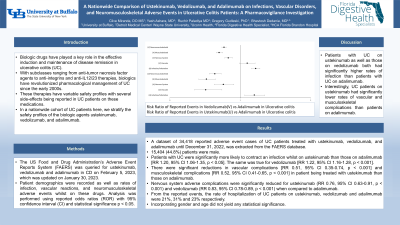Monday Poster Session
Category: IBD
P2191 - A Nationwide Comparison of Ustekinumab, Vedolizumab, and Adalimumab on Infections, Vascular Disorders, and Neuromusculoskeletal Adverse Events in Ulcerative Colitis Patients: A Pharmacovigilance Investigation
Monday, October 23, 2023
10:30 AM - 4:15 PM PT
Location: Exhibit Hall

Has Audio

Clive J. Miranda, DO, MS
University at Buffalo
Buffalo, NY
Presenting Author(s)
Clive J. Miranda, DO, MS1, Yash P. Ashara, MBBS2, Ruchir Paladiya, MD3, Gregory D. Gudleski, PhD1, Bhavtosh Dedania, MD4
1University at Buffalo, Buffalo, NY; 2Mayo Clinic, Rochester, MN; 3UConn Health, Farmington, CT; 4HCA Florida Brandon Hospital, Brandon, FL
Introduction: Biologic drugs have played a key role in the effective induction and maintenance of disease remission in ulcerative colitis (UC). With subclasses ranging from anti-tumor necrosis factor agents to anti-integrins and anti-IL12/23 therapies, biologics have revolutionized pharmacological management of UC since the early 2000s. These therapies have variable safety profiles with several side-effects being reported in UC patients on these medications. In a nationwide cohort of UC patients here, we stratify the safety profiles of the biologic agents ustekinumab, vedolizumab, and adalimumab.
Methods: The US Food and Drug Administration’s Adverse Event Reports System (FAERS) was queried for ustekinumab, vedolizumab and adalimumab in CD on February 5, 2023, which was updated on January 30, 2023. Patient demographics were recorded as well as rates of infection, vascular reactions, and neuromusculoskeletal adverse events whilst on these drugs. Analysis was performed using reported odds ratios (ROR) with 95% confidence interval (CI) and statistical significance p < 0.05.
Results: A dataset of 34,418 reported adverse event cases of UC patients treated with ustekinumab, vedolizumab, and adalimumab until December 31, 2022, was extracted from the FAERS database. 15,404 (44.8%) patients were male. Patients with UC were significantly more likely to contract an infection whilst on ustekinumab than those on adalimumab [RR 1.20, 95% CI 1.06-1.35, p < 0.05]. The same was true for vedolizumab [RR 1.22, 95% CI 1.16-1.28, p < 0.001]. There were significant reductions in vascular complications [RR 0.51, 95% CI 0.35-0.74, p < 0.001] and musculoskeletal complications [RR 0.52, 95% CI 0.41-0.65, p < 0.001] in patient being treated with ustekinumab than those on adalimumab. Nervous system adverse complications were significantly reduced for ustekinumab (RR 0.76, 95% CI 0.63-0.91, p < 0.001) and vedolizumab (RR 0.83, 95% CI 0.78-0.89, p < 0.001) when compared to adalimumab. From the reported events, the rate of hospitalization of UC patients on ustekinumab, vedolizumab and adalimumab were 21%, 31% and 23% respectively. Incorporating gender and age did not yield any statistical significance.
Discussion: Patients with UC on ustekinumab as well as those on vedolizumab both had significantly higher rates of infection than patients with UC on adalimumab. Interestingly, UC patients on ustekinumab had significantly lower rates of vascular and musculoskeletal complications than patients on adalimumab.

Disclosures:
Clive J. Miranda, DO, MS1, Yash P. Ashara, MBBS2, Ruchir Paladiya, MD3, Gregory D. Gudleski, PhD1, Bhavtosh Dedania, MD4. P2191 - A Nationwide Comparison of Ustekinumab, Vedolizumab, and Adalimumab on Infections, Vascular Disorders, and Neuromusculoskeletal Adverse Events in Ulcerative Colitis Patients: A Pharmacovigilance Investigation, ACG 2023 Annual Scientific Meeting Abstracts. Vancouver, BC, Canada: American College of Gastroenterology.
1University at Buffalo, Buffalo, NY; 2Mayo Clinic, Rochester, MN; 3UConn Health, Farmington, CT; 4HCA Florida Brandon Hospital, Brandon, FL
Introduction: Biologic drugs have played a key role in the effective induction and maintenance of disease remission in ulcerative colitis (UC). With subclasses ranging from anti-tumor necrosis factor agents to anti-integrins and anti-IL12/23 therapies, biologics have revolutionized pharmacological management of UC since the early 2000s. These therapies have variable safety profiles with several side-effects being reported in UC patients on these medications. In a nationwide cohort of UC patients here, we stratify the safety profiles of the biologic agents ustekinumab, vedolizumab, and adalimumab.
Methods: The US Food and Drug Administration’s Adverse Event Reports System (FAERS) was queried for ustekinumab, vedolizumab and adalimumab in CD on February 5, 2023, which was updated on January 30, 2023. Patient demographics were recorded as well as rates of infection, vascular reactions, and neuromusculoskeletal adverse events whilst on these drugs. Analysis was performed using reported odds ratios (ROR) with 95% confidence interval (CI) and statistical significance p < 0.05.
Results: A dataset of 34,418 reported adverse event cases of UC patients treated with ustekinumab, vedolizumab, and adalimumab until December 31, 2022, was extracted from the FAERS database. 15,404 (44.8%) patients were male. Patients with UC were significantly more likely to contract an infection whilst on ustekinumab than those on adalimumab [RR 1.20, 95% CI 1.06-1.35, p < 0.05]. The same was true for vedolizumab [RR 1.22, 95% CI 1.16-1.28, p < 0.001]. There were significant reductions in vascular complications [RR 0.51, 95% CI 0.35-0.74, p < 0.001] and musculoskeletal complications [RR 0.52, 95% CI 0.41-0.65, p < 0.001] in patient being treated with ustekinumab than those on adalimumab. Nervous system adverse complications were significantly reduced for ustekinumab (RR 0.76, 95% CI 0.63-0.91, p < 0.001) and vedolizumab (RR 0.83, 95% CI 0.78-0.89, p < 0.001) when compared to adalimumab. From the reported events, the rate of hospitalization of UC patients on ustekinumab, vedolizumab and adalimumab were 21%, 31% and 23% respectively. Incorporating gender and age did not yield any statistical significance.
Discussion: Patients with UC on ustekinumab as well as those on vedolizumab both had significantly higher rates of infection than patients with UC on adalimumab. Interestingly, UC patients on ustekinumab had significantly lower rates of vascular and musculoskeletal complications than patients on adalimumab.

Figure: Forest plot of adverse reactions with ustekinumab (U) and vedolizumab (V) with respect to adalimumab in ulcerative colitis patients
Disclosures:
Clive Miranda indicated no relevant financial relationships.
Yash Ashara indicated no relevant financial relationships.
Ruchir Paladiya indicated no relevant financial relationships.
Gregory Gudleski indicated no relevant financial relationships.
Bhavtosh Dedania indicated no relevant financial relationships.
Clive J. Miranda, DO, MS1, Yash P. Ashara, MBBS2, Ruchir Paladiya, MD3, Gregory D. Gudleski, PhD1, Bhavtosh Dedania, MD4. P2191 - A Nationwide Comparison of Ustekinumab, Vedolizumab, and Adalimumab on Infections, Vascular Disorders, and Neuromusculoskeletal Adverse Events in Ulcerative Colitis Patients: A Pharmacovigilance Investigation, ACG 2023 Annual Scientific Meeting Abstracts. Vancouver, BC, Canada: American College of Gastroenterology.
